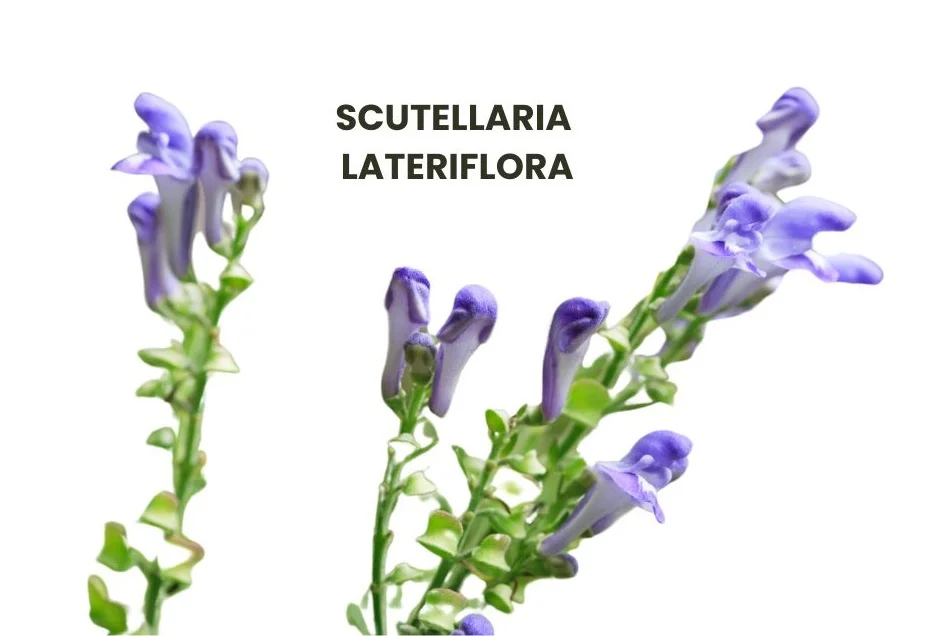Scutellaria Lateriflora, commonly known as Skullcap, is a notable homeopathic and herbal remedy used primarily for its sedative and calming effects on the nervous system.
It is particularly effective in treating conditions of nervousness, anxiety, and spasms.
Skullcap is often used for patients who suffer from nervous fear, irritability, and conditions related to mental strain or overwork, making it an important remedy for nervous disorders, headaches, and sleep disturbances.

SOURCE INFORMATION
Scientific Classification
- Kingdom: Plantae
- Order: Lamiales
- Family: Lamiaceae
- Genus: Scutellaria
- Species: S. lateriflora
Origin
- Native to North America, Skullcap has been used in traditional herbal medicine for centuries as a nervine (nerve tonic) and sedative.
- It was historically employed by Native Americans for treating insomnia, anxiety, and convulsions.
Historical Facts
- The name “Skullcap” comes from the shape of the small flowers that resemble helmets or caps.
- In herbal medicine, it has been known to have a calming effect, especially in cases of stress, agitation, and exhaustion.
PATHOGENESIS
- Scutellaria Lateriflora acts primarily on the nervous system, offering relief from nervous fear, irritability, and various forms of nervous exhaustion.
- It is effective in calming nervous irritation and spasms, particularly in children and individuals recovering from illnesses like influenza.
- It also plays a role in treating headaches, particularly those associated with nervous tension and mental strain.
KEY CHARACTERISTICS
- Nervous Sedative: Particularly useful when nervous fear or irritability is the main symptom.
- Headaches: Offers relief from dull, frontal headaches, especially those related to nervous strain or anxiety.
- Spasms and Twitching: Helps with nervous spasms, muscle twitching, and restlessness, particularly in children and during teething.
- Mental Confusion: Treats confusion, inability to concentrate, and fear of impending calamity.
DETAILED ORGAN SYMPTOMS
MENTAL
- Fear of Calamity: A strong feeling that something bad will happen, causing persistent worry.
- Inability to Concentrate: Difficulty focusing on tasks, leading to mental confusion and forgetfulness.
- This symptom is often found in individuals who are mentally overworked (like school teachers).
- Restlessness: Inability to stay still, often combined with night terrors or vivid, frightening dreams.
HEAD
- Dull, Frontal Headache: Persistent headaches that are dull and located in the front of the head, especially over the right eye.
- Migraine: Particularly those that are worsened by noise, light, or strong odours, and improve with rest or sleep.
- Pressure in Eyes: A sensation as if the eyes are being pressed outward, often accompanying headaches.
STOMACH
- Nausea: Accompanied by sour belching and a sense of discomfort in the stomach.
- Hiccough and Pain: Frequent hiccups with a feeling of distress and uneasiness in the stomach area.
ABDOMEN
- Gas and Distention: The abdomen feels bloated and full of gas, often causing colicky pain.
- Diarrhea: Light-colored diarrhea often accompanies abdominal discomfort.
MALE
- Seminal Emissions and Impotency: Sexual symptoms accompanied by a sense of fear and hopelessness about ever recovering.
SLEEP
- Night Terrors: Waking suddenly with frightful dreams, leading to sleeplessness and night-time restlessness.
- Sudden Wakefulness: A tendency to wake suddenly in the night, often due to disturbing dreams or nervousness.
EXTREMITIES
- Twitching of Muscles: Uncontrolled muscle twitching, particularly in the upper extremities, leading to restlessness and the need to move.
- Chorea: Involuntary jerky movements of the muscles, typically seen in nervous disorders.
- Weakness and Aching: A general feeling of weakness and pain, especially in the upper extremities, often associated with nervous strain.
MODALITIES
- Worse: Symptoms worsen with noise, bright lights, strong odours, and mental overwork. The discomfort is heightened at night, causing sleeplessness and restlessness.
- Better: Improvement is seen with rest, sleep, and the use of calming remedies.
- Many patients find relief by taking small doses of the tincture, especially for headaches and nervous symptoms.
WHAT ARE MODALITIES IN HOMOEOPATHY?
RELATIONSHIP WITH OTHER DRUGS
Compare with,
- Cypripedium: Known for its use in treating nervous exhaustion and irritability.
- Lycopus: Another remedy effective in calming the nervous system and treating conditions related to nervousness and anxiety.
DOSE
- Homeopathic Potency: Scutellaria Lateriflora is commonly used in tincture form or lower potencies (6X to 30X).
- The tincture can be administered in 5-drop doses to relieve symptoms of nervousness, headache, and restlessness.
- Common Dosage: 5 drops of tincture, taken 2-3 times daily, particularly effective for treating nervous headaches and mental strain.
- The tincture can also be diluted in water and sipped slowly for calming effects.
Frequently Asked Questions
What is Scutellaria Lateriflora used for?
- It is primarily used for treating nervous disorders, anxiety, insomnia, and headaches, particularly those caused by mental overwork or strain.
- It is also effective in calming muscle twitching and spasms in children, especially during teething.
Is Skullcap safe for children?
- Yes, it is considered safe for children, particularly for treating nervous irritability, teething troubles, and spasms.
- However, it should be used under the guidance of a qualified practitioner.
Can it help with sleep issues?
- Yes, Skullcap is particularly effective for treating insomnia, restlessness, and night terrors.
- It calms the nervous system and promotes restful sleep.
How does Skullcap compare to other sedative remedies?
- While remedies like Cypripedium are also effective for calming the nerves, Skullcap is particularly useful when nervous fear and muscle twitching are present.
- It also works well for headaches related to mental strain, making it distinct in its therapeutic range.
Glossary of Difficult Words
- Nervine: A substance that calms the nerves.
- Chorea: A nervous disorder causing involuntary, jerky movements.
- Twitching: Involuntary movements or spasms of the muscles.
- Migraine: A severe form of headache, often accompanied by nausea and sensitivity to light or sound.
- Restlessness: A state of being unable to remain still due to nervousness or agitation.
